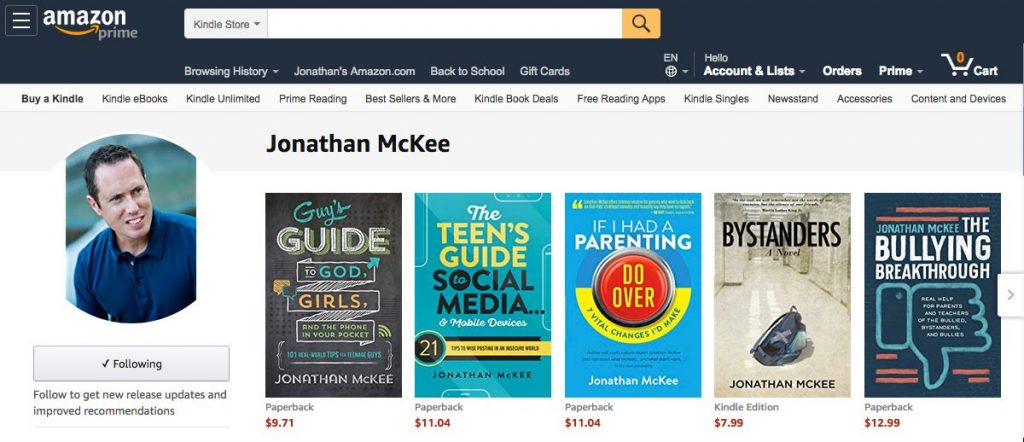3 Proactive Practices Parents Can Pursue
Jonathan McKee
Last week on a radio show the host asked me, “Jonathan, in your book, If I Had a Parenting Do Over, you talked about seven vital changes you’d make parenting today. What is the one biggest parenting practice you wish you could do over?”
Without hesitation I responded, “I wish I had spent less time trying to block out the lies and more time focusing on the truth.”
Martin Luther King Jr. said:
Darkness cannot drive out darkness; only light can do that.
Hate cannot drive out hate: only love can do that.
That’s amazing parenting advice, and it’s relevant today more than ever before. Today ‘Generation-screen’ is inundated with distractions: porn just a click away, poor role models infesting their Instagram feed, music with misleading lyrics, and every form of enticing entertainment imaginable from YouTube to Netflix. It’s easy for parents to become scared about these influences, panic and overreact. Sometimes we become so focused on finding the perfect defense we forget about our offensive line! (I know that well, I’m a Denver Broncos fan). Here lies the mistake. Once we find the perfect porn filters or software monitoring, we subconsciously think, “Whew. Now my kids are safe from the lies.” The question remains: So who’s gonna tell them the truth?
In a world so potent with lies, today’s parents need to be that much more proactive about engaging their kids in conversations about truth. The big question is—what does this actually look like?
Here’s 3 ways I have observed parents experience success setting the stage to dialogue about truth:
1. Don’t just drop your kids off at youth group
Key word: just. Church, youth groups and Bible studies are awesome ways for kids to learn more about God, build community with other believers, and connect with positive adult mentors. And yes, that two or three hours of church each week can be powerful, because the Gospel message is powerful (“the power of God at work saving everyone who believes,” Romans 1:16, NLT)… but that doesn’t mean your job is done.
When my kids were young, I remember a very eye-opening evening where our family was talking and laughing together in a hotel room (with my speaking schedule we spent many a night in hotels when my kids were growing up) and somehow the subject of “Father Abraham” came up. In a matter of moments we realized our kids had no idea who Abraham was. My kids had literally spent years in Sunday School. We just assumed they knew the story of Abraham and Sarah, or at least the silly song… Father Abraham had many sons…
I remember asking them, “Well you guys at least remember the story of Jacob and Esau… the two brothers who fought over their birthright?”
Silence.
“Joseph?” I pressed on, hoping for a spark of recognition. “Coat of many colors. Sold into slavery by his brothers? Became ruler of Egypt?”
More silence.
“Moses? Ten Commandments?”
“Oh yeah,” my son finally spoke up. “The Prince of Egypt” (referring to the animated film).
Lori and I sighed and looked at each other like, What are our kids doing in Sunday School each week. . . because they sure aren’t learning any Bible? But that blame shifting only lasted for a few seconds because it became obvious to us, maybe we should be proactively talking about this stuff as a family too! Duh!
Yes, I’m confessing that we really didn’t do family devotions of any kind up to that point. But at that moment… everything changed. And we started in Genesis 1, which was really easy because I had just taken an Old Testament class in seminary and Lori had just finished an inductive Bible study on the book of Genesis at our church.
Which leads me to another proactive practice…
2. Get rooted in scripture
Key word: rooted. Think of the tree in Psalm 1 planted by the river. It grew strong and green when everything not connected to a life source was dry and dead. When mom and dad grow roots, that’s when they produce fruit.
Yeah… that means it starts with us.
I remember hearing some amazing parenting advice for dads: if you want to be a good parent, it starts by being a good husband. A good marriage rubs off on the kids. We’re talking about the trickle-down effect. The more mom and dad become transformed by scripture, the more the truth naturally flows from them.
So allow me to meddle for just a moment. What are you personally reading in God’s Word right now? If you aren’t, you could start in the book of Luke. Just read a chapter a day. Then move onto Acts. Finish that? Then try Paul’s letters (Galatians, Ephesians, Philippians, Colossians). It doesn’t matter if you’ve never read it before. It’s amazing how potent getting away and reading the word is (just ask Chance the Rapper when he opened Galatians for the first time).
The more it changes us, the more God will change our family. It will change the way we talk. It will change the way we react when our kids test us… which brings up one more proactive practice…
3. Create a safe place
Key word: safe. Do your kids feel safe to ask you questions about anything?
“Mom, I don’t know if I believe in God?”
“Mom, what does bl**job mean?”
How are we going to engage in dialogue about truth if our kids are too afraid to ask us questions? When I surveyed kids, “Why don’t you ask your parents your honest questions about sex?” …by far the most common response was, “Because I know they’ll freak out.”
I realize this is difficult for parents because we are always leaping to the question behind the question. If our kid asks us about sex, we wonder, are they considering sex? With who? Is it that boy Chris? I KNEW I SHOULD NEVER HAVE LET YOU HANG OUT WITH HIM! (Sound familiar?)
If our kids are experiencing doubts about their faith, our tendency is to take it personal and respond poorly. “I never raised you like this!” On the contrary, we should be glad when our kids feel safe enough to verbalize their doubts. Like Kara Powell so profoundly put it, “it’s not doubt that’s toxic to faith, it’s silence.”
Are you creating a climate of comfortable conversation in your home?
The more we are personally in God’s Word, praying, submitting and allowing him to transform our thinking more like His, the more we’ll respond like Jesus when He encountered sinners. This enables us to “set our minds” on things above and respond better when people drop a bomb on us… like, “Oh, I’m Bisexual.”
* * *
And yes… when you pursue these three practices above, that sets the stage to opening up the Bible after dinner and reading the word together as a family. If you feel ill equipped to read the Bible and answer your kids’ questions, don’t hesitate to use some fun devotional resources (my friend Greg still says his best family devotions were always when he went through my Zombie Apocalypse Survival Guide for Teenagers… which is basically an “our daily bread” for teenagers). Whatever method you use, make time to read truth together as a family (and here’s a few more ideas of what that can look like).
Rooted
I admit it—I have one of the best-looking lawns in the neighborhood. Lush, green, perfectly mowed and edged. Because of that, my neighbors ask me, “How do you get rid of crabgrass?”
My honest answer: “I don’t know. I’ve never had it.”
I’ve always started fresh with my lawns and I’ve never allowed crabgrass to take over. How? By fertilizing every six to eight weeks with a good TurfBuilder. It makes the lawn so strong that weeds rarely penetrate. Yes, on occasion I’ve had to pluck a stray weed or two, but it’s never become a problem, because my lawn is strongly rooted with the good stuff.
What is your family rooted in?
We will not hide these truths from our children;
we will tell the next generation
about the glorious deeds of the Lord,
about his power and his mighty wonders.
(Psalms 78:4, NLT)
FOR MORE HELP OPENING UP THE DOORS OF DIALOGUE WITH YOUR KIDS ABOUT TRUTH TAKE A PEEK AT JONATHAN’S BOOKS TO PARENTS AND YOUNG PEOPLE!








 David Murray -
David Murray - 